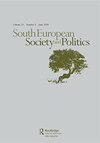社交媒体上的政治两极分化:土耳其对民主的竞争理解
IF 4.6
1区 社会学
Q1 POLITICAL SCIENCE
引用次数: 0
摘要
政治两极分化加剧威胁着民主的稳定。虽然先前的研究发现,在竞争群体使用不同的术语来描述同一主题时,会出现两极分化,但我们强调,在群体对同一术语的不同含义的依恋中,这种两极分化也很明显。对公共领域主导地位的竞争反映在社交媒体上,社交媒体成为争论的场所,展示了对抗性的合法性主张。在2019年6月土耳其伊斯坦布尔重新选举的案例研究中,我们使用定性和计算方法分析了大约11.6万条推文,重点关注围绕“民主”、“选举”和“公共服务”主题的讨论。推特用户将投票行为不仅与选举候选人联系在一起,还与土耳其民主未来的竞争联系在一起。本文章由计算机程序翻译,如有差异,请以英文原文为准。
Political Polarisation on Social Media: Competing Understandings of Democracy in Turkey
ABSTRACT Heightened political polarisation threatens democratic stability. While prior studies find polarisation in competing groups’ deployment of different terminologies to describe the same topic, we emphasise that it can also be evident in groups’ attachment of different meanings to the same terminology. Competition for dominance in the public sphere is reflected in social media which become sites of contestation, showcasing antagonistic claims of legitimacy. In a case-study of the June 2019 rerun Istanbul elections in Turkey, we used qualitative and computational methods to analyse approximately 116,000 tweets, focusing on discussions around the themes of ‘democracy’, ‘elections’, and ‘public service’. Twitter users associated the act of casting a vote not only with electing the candidate, but also with a competition over the future of Turkish democracy.
求助全文
通过发布文献求助,成功后即可免费获取论文全文。
去求助
来源期刊

South European Society and Politics
Multiple-
CiteScore
5.80
自引率
21.20%
发文量
14
期刊介绍:
A leading point of reference for scholars of Southern Europe, South European Society and Politics promotes both comparative and inter-disciplinary analyses, as well as offering innovative single county and sub-national studies. The journal acts as a forum for social, economic, cultural, contemporary historical and political approaches to research on the region, and is particularly keen to sponsor policy–focused studies in all these disciplines. The journal publishes research articles; South European Atlas with election reports and articles on other subjects of topical interest, and an extensive book reviews section, including both review articles and individual book reviews.
 求助内容:
求助内容: 应助结果提醒方式:
应助结果提醒方式:


